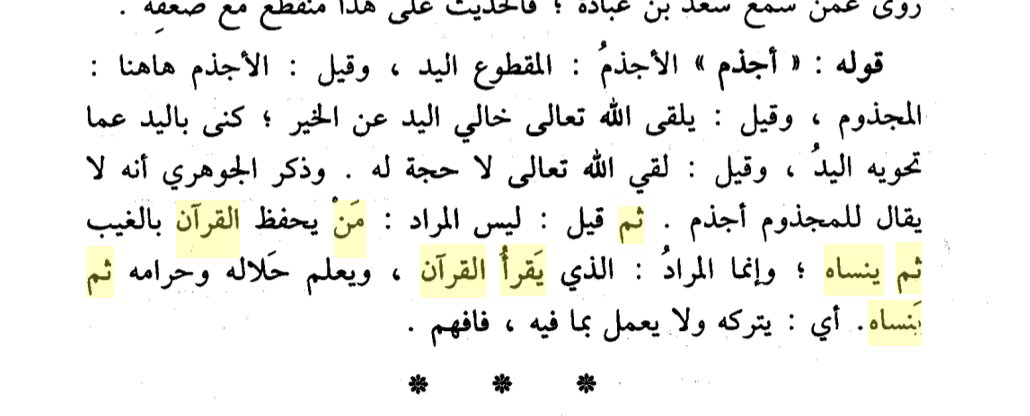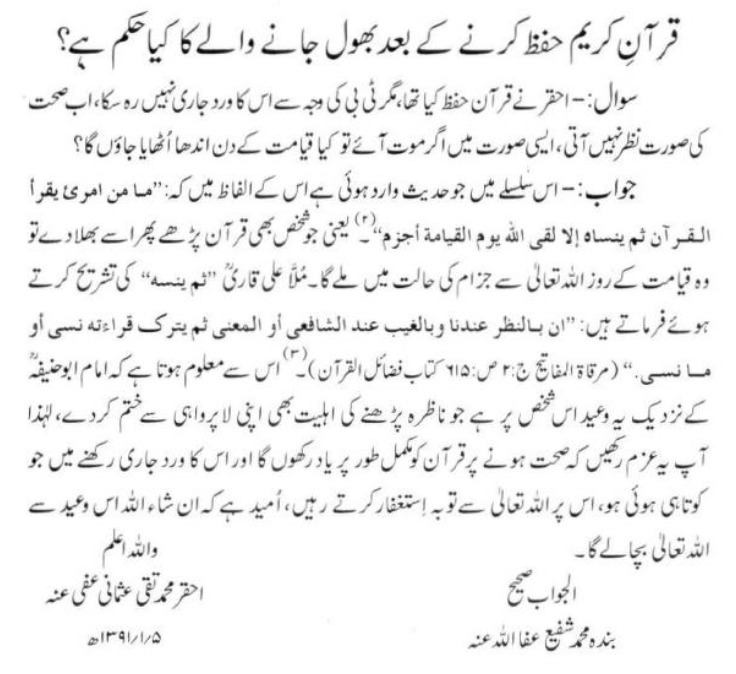Some (mis)use Prophetic traditions to scare people away from memorising the Quran, or becoming a Hafiz.
The point is to sustain a relationship, engage, and to facilitate its smooth recitation.
That narrative is missing.
But first let& #39;s look at one tradition often used.
The point is to sustain a relationship, engage, and to facilitate its smooth recitation.
That narrative is missing.
But first let& #39;s look at one tradition often used.
Narrated by Sa’d ibn ‘Ubādah: The Prophet (ﷺ) said:
"No man recites the Qur’ān, then forgets it, except that he will meet Allah on the Day of Judgment in an ill condition (disfigured or empty-handed, or with no excuse)".
"No man recites the Qur’ān, then forgets it, except that he will meet Allah on the Day of Judgment in an ill condition (disfigured or empty-handed, or with no excuse)".
Here is the Arabic original:
حدثنا محمد بن العلاء أخبرنا ابن إدريس عن يزيد بن أبي زياد عن عيسى بن فائد عن سعد بن عبادة رضي الله عنه قال: قال رسول الله صلى الله عليه وآله وسلم: (ما من امرئ يقرأ القرآن ثم ينساه إلا لقي الله عز وجل يوم القيامة أجذم)].
--------
حدثنا محمد بن العلاء أخبرنا ابن إدريس عن يزيد بن أبي زياد عن عيسى بن فائد عن سعد بن عبادة رضي الله عنه قال: قال رسول الله صلى الله عليه وآله وسلم: (ما من امرئ يقرأ القرآن ثم ينساه إلا لقي الله عز وجل يوم القيامة أجذم)].
--------
We will deal with the strength or otherwise of the narration later. When you are talking of a punishment to come, one needs to consider the strength of that claim very carefully.
But let’s continue.
But let’s continue.
Notice in this ḥadīth that it says:
"whoever recites" not "whoever memorises"
We& #39;re talking apples and pears here. Both my favourite by the way.
But it& #39;s clear.
"whoever recites" not "whoever memorises"
We& #39;re talking apples and pears here. Both my favourite by the way.
But it& #39;s clear.
In the Hanafi school, many scholars state that forgetting how to recite means just that, or not acting upon the Quran after knowing what it contains.
Not forgetting it after memorising it.
For example, here is Badr al-Dīn al-& #39;Aynī:
There are more references.
Not forgetting it after memorising it.
For example, here is Badr al-Dīn al-& #39;Aynī:
There are more references.
So, this particular ḥadīth in question is referring to those who become negligent over its recitation - to "cut themselves off" from the Quran as it were; that they can no longer recite it.
You see the relationship between this worldly act and the otherworldly consequence?
You see the relationship between this worldly act and the otherworldly consequence?
A friend shared this with me. Written by Mufti Taqi sb which talks of someone who had forgotten the Quran because of tuberculosis.
It makes a similar point to above.
It makes a similar point to above.
But of course, one should make an effort to keep on reciting the Quran after having memorised it.
But don& #39;t be put off from memorising.
But don& #39;t be put off from memorising.
We all forget things. It happens.
We are insān after all. We forget. Especially as we age.
But the zikr is to remind, we have to keep reciting, to keep reminding as it were.
We are insān after all. We forget. Especially as we age.
But the zikr is to remind, we have to keep reciting, to keep reminding as it were.
Also, one of the points of memorising the Quran - as a friend kindly told me is for تسهيل ـ - to make it easy to recite. Because you& #39;ve read it so many times, it becomes natural for you.
Anyways, I love you all.
Anyways, I love you all.
Memorising the Quran has been a very personal journey for me.
The fear of forgetting it has given me many sleepless nights.
But it did not need to have been this way.
Understanding this ḥadīth (and others) has given me comfort.
The fear of forgetting it has given me many sleepless nights.
But it did not need to have been this way.
Understanding this ḥadīth (and others) has given me comfort.
This is a journey for us all.
And I am grateful to you all for being on this journey of discovery.
:)
And I am grateful to you all for being on this journey of discovery.
:)

 Read on Twitter
Read on Twitter



